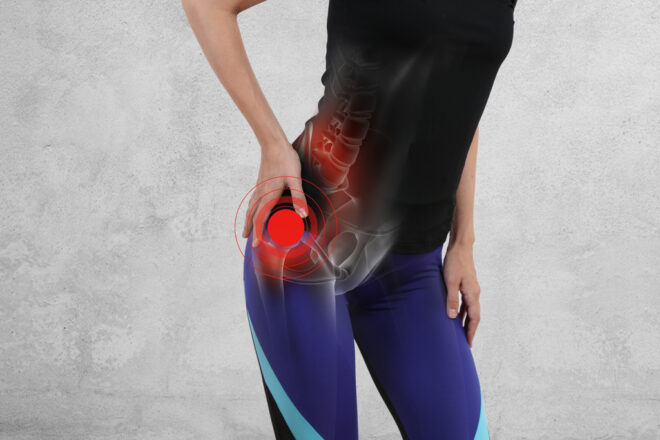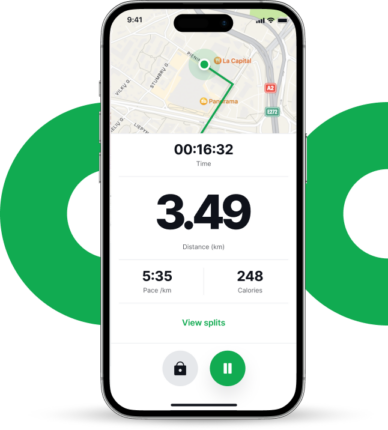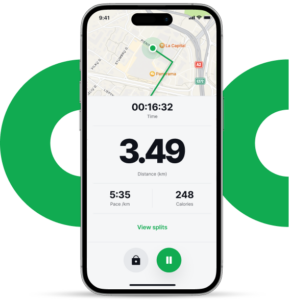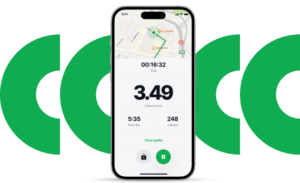Do your hips hurt after running? As a runner, you’re likely to experience hip pain at some point.
But that doesn’t mean you should put up with the pain. Running through the pain will only make it worse. Instead, it’s important to understand what’s causing it and when to stop.
In this post, we cover everything you need to know about hip pain in runners. Read on to find out about running hip pain symptoms, causes, treatment, and prevention.
Let’s start with the basics.
In This Article:
Common Symptoms of Hip Pain Running
The hip joint consists of the upper part of the thigh bone and the pelvis socket into which it sits.
Ligaments and several types of muscles, including the hip extensors, flexors, adductors, and rotators, reinforce the hip joint. They enable it to function properly.
Common symptoms of hip pain in runners include:
- Pain on the inside or outside of your hip, in the groin, upper thigh, or buttock
- Swelling, tenderness, and/or bruising in the affected area
- Weakness in the hip joint
- Discomfort or pain when lying down on the affected hip
Hip pain in runners can happen during and after runs. It can be dull or sharp. It will differ in location, intensity, and duration depending on the underlying cause.
Causes of Hip Pain From Running
So, why does your hip hurt after running?
From muscle strains and hip bursitis to stress fractures and tendonitis, hip pain from running has many causes. Understanding what exactly is causing your hip ache is important to getting the right treatment.
Muscle strains
Pulled or strained muscles cause hip pain when running. Often, the culprits are the gluteus muscles.
The buttocks consist of three gluteal muscles each: the gluteus maximus, medius, and minimus. These muscles stabilize the hip and enable you to straighten it.
If you run too much or faster than you’re used to, you may suffer a gluteal tear or strain. Symptoms include sudden sharp pain when running. You may also experience swelling, tenderness, and stiffness the next day.
Gluteus strain hip pain tends to fade over time. But you may continue to feel it when running or climbing stairs. Muscle strains after running can be serious enough to require medical treatment.
Hip bursitis
Your joints have fluid-filled cushions called bursae. The bursae reduce the friction between the bones and softer tissues of the joints.
The hip joint is no exception. It has a bursa on the front, near the groin (iliopsoas bursa). And another between the pelvis and the top of the thigh (trochanteric bursa).
Repeated friction or pressure on these bursae can lead to hip bursitis, a condition that causes hip pain after running.
Hip bursitis also causes hip pain when running, standing up, or squatting. It can be especially unpleasant at night. Trochanteric bursitis is more common among runners than iliopsoas bursitis.
Labral cartilage tears
Running a lot can cause tears in the labrum. This is the cartilage ring around the socket of the pelvis, which helps stabilize the hip joint.
Labral cartilage tears cause sharp pain near the groin, difficulties moving, and weakness in the hip. You may also hear a clicking sound. Or feel that your hip locks when moving.
Labral tears are common in runners and athletes. However, there are many other causes of nonlabral hip pain. It’s important to rule those out.
Osteoarthritis
The hip joint bears significant pressure each time you stand or move. Because of this, the hip is more likely to develop arthritis than other joints.
Osteoarthritis of the hip typically affects older runners. It causes persistent pain and stiffness. The pain may also flare up when you run or exercise.
You may also experience decreased range of motion in the hip joint. Left untreated, it may lead to the breaking down of the hip joint cartilage.
You’re more likely to develop this condition as you age. The risk increases if you’ve had labral tears and other hip injuries. High body weight and a family history of the condition further increase the risk.
Overuse
Running long and hard? Overusing muscles and putting too much stress on your joints can lead to hip pain from running.
Muscle overuse can cause bursitis, which may feel like a burn or ache in your hip. If you end up with a sore hip from running, it may be a sign your body’s giving you to take it easier.
Another overuse injury common among runners is Iliotibial band syndrome (ITB). ITB may cause hip pain. This occurs if the iliotibial band, a long tendon running down the side of your thigh to the shinbone, rubs against the outside point of the hip.
Stress fractures
A stress fracture is what it sounds like – cracks in the bone brought on by repeated stress. Stress fractures affecting the hip can be painful. Keeping on running makes the pain worse and can increase the damage.
Repeated stress from running can also cause a hip fracture, which occurs when the upper thighbone breaks. It causes pain, often sharp and severe, and limited mobility. You may feel the pain in the outer hip as well as in the thigh, groin, and pelvis.
Tendonitis
Tendonitis occurs when tendons that attach muscles to your bones become inflamed. It commonly affects runners who don’t rest enough. Tendonitis causes hip pain after running.
Tendonitis can affect different hip tendons. The location of the pain will vary depending on the inflamed tendon.
Hip flexor tendons cause pain at the front of the hip joint. You may develop hip flexor pain running uphill or sprinting.
Adductor tendonitis causes pain in the inner thigh and groin area. The adductors muscles stabilize your thigh bone and pelvis. You rely on them, especially when sprinting or running uphill or downhill.
Hamstring tendonitis causes pain and stiffness in your thigh and hip. The injury can occur if you suddenly stop when running. Or when you push off a hard surface.
Treatment of Hip Injuries From Running
Rest is crucial for the treatment of all hip injuries from running. If you experience hip pain when running, stop for the day. If you have hip pain after running, rest for at least a few days.
The best treatment for hip injuries from running depends on the underlying causes. Often, it’s difficult to tell what causes your hip pain without seeing a doctor.
The most common treatments for hip pain from running include:
- Rest – Cut back your mileage by 50% or avoid running for a week or two.
- Ice – Apply ice to your hip for up to 20 minutes every two hours. It will help reduce pain and inflammation.
- Over-the-counter anti-inflammatory drugs – Non-steroidal drugs like ibuprofen and aspirin can reduce inflammation.
- Physical therapy – If hip pain is a recurrent problem, a physical therapist can help treat it. What’s more, they may spot muscle imbalances and check your running form to identify factors contributing to hip pain when running.
- Injections – Your doctor may recommend corticosteroids if oral anti-inflammatory drugs don’t work.
- Surgery – Serious hip injuries, including muscle tears and tendon damage, may require surgery. Your doctor may also recommend surgery for advanced osteoarthritis.
Important: If the hip pain doesn’t go away within days, it’s best to see a doctor. In addition to a physical examination, they may recommend X-ray or MRI scans and other tests for an accurate diagnosis.
Can you continue to run with hip bursitis?
It’s not a good idea. Hip bursitis is often an overuse injury. Running with hip bursitis can worsen the injury and sideline you for months.
It’s best to stop running and rest until you can run without pain. This may take anywhere from a few days to a few weeks. If you’re concerned, talk with your doctor.
How do I relieve hip pain from running?
The easiest way to relieve hip pain from running is to stop running, rest, and ice the affected area for 20 minutes every hour or two. If the pain is severe, you can take non-steroidal anti-inflammatory drugs (NSAIDS). These should relieve the pain.
How to Prevent Hip Injuries?
There’s a lot you can do to reduce your risk of suffering a hip injury. Even if you’re a dedicated runner training for a marathon or ultramarathon.
- Don’t push yourself too hard – Hip pain when running is all too often the result of overtraining. Pay attention to your body to challenge yourself without the risk of injury.
- Always warm up – Do dynamic stretches and other warmup exercises before running.
- Wear high-quality running shoes – They will absorb shock as you run, reducing the stress on your joints.
- Cross-train – Swimming and aqua jogging enable you to exercise your leg muscles without putting stress on your hip joints.
- Work toward balanced muscle groups – Muscle imbalances in the legs, back, and other parts of the body increase the risk of running injuries. Use strength exercises to develop all your muscles, not only running muscles.
- Address existing injuries – Running with a runner’s knee or other running injuries can affect your running form and technique. This, in turn, may put more stress on your hip joints.
Takeaways
Next time you end up with a hip hurting after running, keep these things in mind.
- Stop and rest if you feel hip pain when running, or you could worsen the injury.
- Listen to your body –hip pain can be a sign you’re pushing yourself too hard.
- Treat the pain with ice, rest, and NSAIDs if necessary.
- Preventing hip pain is better than having to treat it.
- Start with good warmups and use the proper running gear.
- See a doctor if the pain is intense or doesn’t go away after a day or two.














